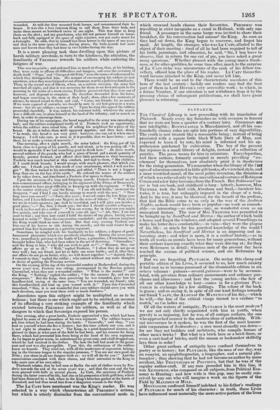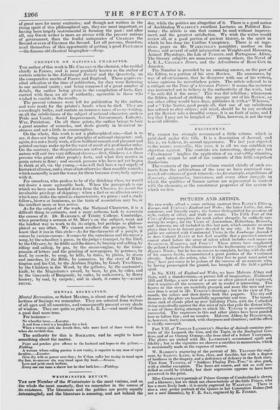PLUTARCH.
THE Classical Library is now proceeding with its translation of Plutarch. Nearly every day furnishes us with occasion to lament that we were not born a quarter of a century later. Grammars are now intelligible; BONNYCASTLE is Macadamized, and all his con- foundedly clumsy rules are split into portions of easy digestibility. The youth is now treated like a reasonable being ; instead of being presented with a square little black Whole Duty of Man, and expected to learn it by rote, his mind is informed and his ap- prehension quickened by cultivation. The boy of the present day rejoices in a small library of delight, instead of a collection of puzzles. The press teems for him in miniature. Encyclopmdias, and their authors, formerly occupied in merely providing "ex- citement" for themselves, now absolutely print it in duodecimo for the rising generation. We remember when the library of the f tat ages of education consisted in little gilt books, of a wretched style, and a more wretched moral, of the most paltry invention, the drearineEs- of which was relieved only by the marvellous adventures of Robinson Crusoe and a few fairy larcenies from the French. But Robinson Cru- soe is but one book, and childhood is long : latterly, however, Mrs, TRIMMER took the field with Abraham and Saul,—luculent his- tories, it is true, but unhappily imposed in the shape of a task. And by the way, it may be observed, for the benefit of the profane, that had the Bible come to us only in the way of the Arabian Night*, no book would have been SO popular—no work so remark- able—so interesting—so curious—nay, so wonderful even as an uninspired history. The rear of Mrs. Tatiummt was permitted' to be brought up by Sandford and Merton ; the author of which built a house and forgot the windows, and adopted several Foundlings to make his latter days comfortable ;—in vain—they were the plague of his life : so much for his practical knowledge of the world ! Nevertheless, his Sandford and Merton is an imposing and in- teresting story; and what is more, it is a radical history,—as in truth all Works on morals have been for many generations, without their authors knowing exactly what they were driving at; for they were Reformers in detail ; whereas men of the present day have reached the axioms of political science, and are Reformers by principle. But we are forgetting PLumacn. On seeing this cheap and portable edition of his Lives, it occurred to us, how much anxiety it had cost us to become possessed of the abominable edition in six octavo volumes : guineas—several guineas—were to be accumu- lated, with privation from ordinary amusements and ordinary pur- chases and allowances : and here the young urchin—the heir of all our other knowledge to boot—comes in for a glorious PL-u- TARCH in exchange for a few shillings. The colour of the back is green; and on seeing it, in spite of all our kind feelings towards our friend VALPY, the 711.nus or the MANUTIUS of his day,—which lie will,—the hue of the critical visage turned to a verdure "to match," as the ladies say. Of all the writers of antiquity, PLUTARCH is the most modern 7. we are not only chiefly acquainted with him in youth, when gravity is so imposing, but he was, of all antique authors, the one who approached nearest to the modern ideas of authorship. With- out irreverence be it spoken, he was the first of the most honour- able corporation of bookrnahers ; a race most absurdly run down— for are they not builders and architects, who compile houses: of other men's bricks ? But what is a brick here or a brick there, or even a cart-load of bricks, until the mason or bookmaker skilfully lays them in order? Other great authors of antiquity have confined themselves to poetry or to history; but PLUTARCH, like the mea of our day, was an essayist, an apophthegmetist, a biographer, and a natural phi- losopher; thus showing that he had not become an author by mere accident, like THUCYDIDES or POLYBIUS, but that he was of the regular author-craft. If any man preceded him in this line, it was X.ExopsoN, who composed on all subjects, from Political Eco- nomy to Hunting: and how wide is this gap, may be easily con- ceived by any one who will imagine a work on the Sports of the Field by MALTHUS or MILL. MONTAIGNE confessed himself indebted to his father's readings of PLUTARCH for much of his character: in truth, these Lives have influenced most materially the more active portion of the lives of great men for many centuries; and though not written in the rising spirit of this philosophical age, they are most important, as having been largely instrumental in forming the past : and after all, any Greek writer is more au niveau with the present notions of government, than the feudal antiquaries of CHARLES the Second or even of GEORGE the Second. Let all persons, therefore, avail themselves of this opportunity of getting a good PLUTARCH —the famous old classical biographer—cheap.



















































 Previous page
Previous page